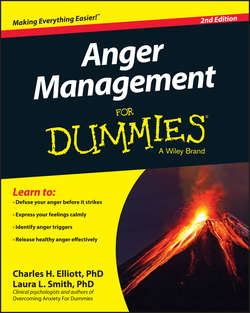Читать книгу Anger Management For Dummies - W. Doyle Gentry - Страница 6
На сайте Литреса книга снята с продажи.
Part I
Getting Started with Anger Management
Chapter 1
Understanding Anger
Anger Really Is About Choices and Perceptions
ОглавлениеHumans are the only animals we know of that have a choice about how they view the world. Cats, dogs, squirrels, hamsters, goldfish – they’re all creatures of instinct, which means they respond in predictable ways that are prewired into their nervous systems. Instincts are universal – scratch a Golden Doodle’s tummy and he’ll instantly begin shaking his hind leg. All Golden Doodles do it, and they don’t have a choice in the matter.
The miraculous thing about being human is that you’re not ruled by instinct. Not only do you have choices about how you respond to the world around you (for example, when someone mistreats you), but even before that, you also have a choice about how you perceive or think about that person’s actions.
Do you think she did that on purpose? Was it an accident, or did he do it deliberately? Is the mistreatment specifically directed at you alone? Do you view this as a catastrophe – a life-altering event? Is this something that you think shouldn’t have happened? These questions are all ones your mind considers, albeit unconsciously, before you have a chance to react – or, better yet, respond to provocation. Consider the following:
You might say that Mike is a born pessimist, but actually that’s not true. Human beings aren’t born with attitudes – those attitudes come from life experience. What is true is that Mike is the product of an alcoholic home, where things could be going well one minute and fall into complete chaos the next. He found out as a child not to expect the good times to last and that he and the rest of his family were always just one beer away from a family crisis.
So for all his adult life, Mike has expected that most things will eventually turn out badly, given enough time. No matter how loving his wife is or how cooperative his children are, in the back of his mind he harbors this expectation that any minute things will change for the worse – and he’s ready to react in anger when that moment comes. Why will he get angry? It’s Mike’s way of defending himself against chaos, a way of feeling in control – unlike when he was a child hiding under the bed while his alcoholic father ranted and raved well into the night.
Mike is unaware of how his early childhood influenced his view of the world. Like most children of alcoholics, he figures that because he survived those unpleasant years (physically at least), he’s okay. He also has no clue why he loses his temper so easily.
Many people with anger problems have troubled childhoods. Their anger during childhood usually made sense at the time as a way of coping with the difficulties they faced. However, they bring their anger into the present when it usually doesn’t work very well. You can acquire new, more effective ways of coping, but it takes patience and work.
